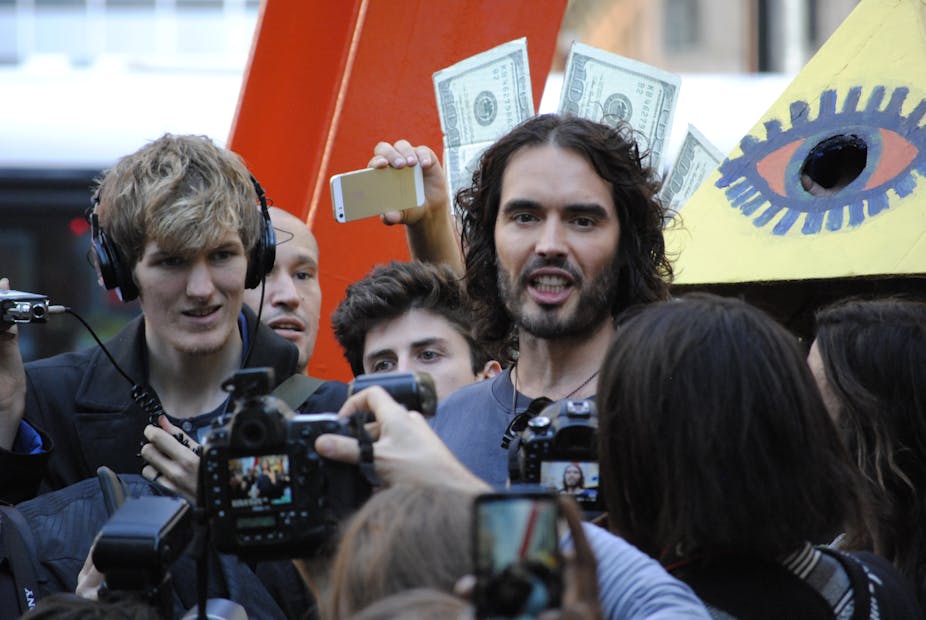As Britain’s longest-ever election campaign reaches its final excruciating moments, Russell Brand announced his support for the return of a Labour government.
A celebrity endorsement is not usually a matter of great political moment. But in a campaign which has failed to engender much enthusiasm, Brand’s announcement created a splash – for journalists at least. For Brand is no ordinary celebrity and his announcement marks a complete turnabout in his attitude to voting.
In 2013 Brand told the BBC that he had never voted and would never do so, because of “the lies, treachery and deceit of the political class that has been going on for generations”.
He encouraged others to abstain as the only way to bring about change. From that moment the media anointed Brand the leader of those largely urban, mostly young and often poor Britons disenchanted by a political system that did not represent them and expected them to bear much of the burden of austerity. A millionaire comedian maybe a paradoxical tribune of the streets, but that is what Brand effectively became.
If Brand’s views were not always as coherent as they might have been and usually expressed in his own peculiar argot, with 10m Twitter followers and millions of viewers for his YouTube channel he had, at the very least, the kind of audience for which most politicians would kill, and one that they were not reaching.
Volte face
So, as the poster boy for political disenchantment, Brand’s support for Labour represents a complete volte face – and one for which Labour leader Ed Miliband should get much credit.
Being interviewed in Brand’s kitchen on YouTube was never going to win Miliband many plaudits from the political establishment but he presumably calculated that this was one way to talk to people who would not be glued to the next Labour party election broadcast.
More than one million saw him attempt to persuade Brand that there was a point to representative democracy, that if radical change within the system was difficult, it could be won.
In fact, an important element of Labour’s 2015 campaign has been, at Miliband’s behest, addressed to younger voters. The aim has been to convince them that a Labour Government could improve their life chances. Since becoming Labour leader in 2010, Miliband has been trying to turn the party away from its uncritical enthusiasm for the market and towards representing those – the majority he hopes – left behind while an elite has become ever richer.

Brand’s endorsement is therefore important, at least for what it symbolises. But it was hardly unqualified. From his bedroom he told his YouTube viewers that he was convinced that Miliband will listen if they speak but added that he disliked Labour’s support for Trident and its policies on immigration.
Power to Brand’s people
Will young people be influenced by Brand? In a completely unscientific survey of second-year University of Nottingham politics and history undergraduates, 25% said his endorsement made them think more positively about Labour, 75% said it made no difference to their party choice.
Miliband certainly hopes Brand will persuade the hitherto alienated young to vote Labour. Owen Jones, the left-wing Guardian columnist thinks it will and claimed the Conservatives were worried by the effect of Brand’s endorsement. If they are, Conservative leaders are keeping their fears private. In fact they and their allies in the media have used Brand’s endorsement to further highlight their claim that a Miliband government will be chaotic and disastrously left wing.
On that basis, if Brand does attract a few young voters to Labour’s cause, some on the right think the switch will be more than compensated for by older voters taking fright and voting Conservative.
If Miliband does form the next government, Brand says he expects “more democracy, more power to more communities”. This means the Labour leader is under an obligation to ensure things do change materially for the people Brand represents.
This will be a hard task especially as Miliband is committed to balancing government spending and will undoubtedly be leading a minority administration.
Given his record of inconsistency one wonders how long it will take Brand, in such circumstances, to claim that Miliband has let him down.

